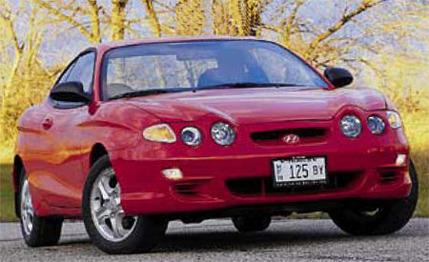 Short Take Road Test
Short Take Road Test
Distinctive new looks? Oh, yes. Whether that's a good thing may depend on your age. If you're old enough to vote, you may be over the hill as a Hyundai Tiburon customer.
For its first major makeover since it was introduced three years ago, the Tiburon gets four round headlights replacing the two teardrop-shaped lights, as well as some angular, edgy resculpturing to the sides and rear.
The effect is about as dramatic as it gets for $15,000. For a financially challenged Korean automaker that is still battling for acceptance in the U.S., you do what you can to draw attention.
Painted an electric "Cardinal Red," the Tiburon appears to be what it is: the sportiest car Hyundai sells, genuinely looking the part with handsome spoked alloy wheels, an oversize chrome exhaust pipe, and the optional ($450) decklid spoiler.
Besides the styling, Hyundai made another major change to the Tiburon for 2000. Previously offered in two trim levels, the Tiburon now comes in only one, sort of a cross between the base model and the upscale FX version. Many of the features hitherto available only on the FX package are now standard, but the base price remains the same -- $14,434.
That price includes almost everything you'd need -- air conditioning; power windows, locks and mirrors; a reasonably good AM/FM/cassette player; cruise control; a tilting steering wheel; and a very good tire and wheel package. Our test Tiburon had as optional only the aforementioned rear spoiler, plus a center console armrest ($130), carpeted floor mats ($75), and mud guards ($60). The total comes to $15,149 for a car that looks and feels as if it should cost more.
Well, up to a point, anyway. The Tiburon's only available engine is a DOHC 2.0-liter, 16-valve four-cylinder. That sounds like a reasonably cutting-edge powerplant, but it's pretty short on refinement, especially compared with, say, Honda's four-bangers. That is not to say it's a terrible engine, because it isn't. Although fuel mileage is average for an engine this size, the power output of 140 is plenty potent, giving the Tiburon above-average acceleration. It's just that while you're accelerating, there's more noise and vibration than there ought to be.
There is also evidence in the interior of cost cutting. On rough roads, there were a couple of minor rattles. The front bucket seats could use a little more padding and side support -- Hyundai's seats are improving, but they still have a way to go.
And most of the dashboard controls are painted silver, apparently to approximate brushed aluminum, but they are plain old unevenly painted plastic. It's as if Hyundai interior engineers got a gander at the interior of the Audi TT, which does use brushed aluminum to stellar effect, and tried to duplicate it as the cars were rolling out the door. The coloring of the climate controls makes it hard to tell what setting they're on. At night, the dashboard looks fine; in the light of day, it appears cheap.
In other areas, though, Hyundai got things very right. The five-speed manual transmission has a superb shifter feel, better even than that of the class-leading Honda Civic. The clutch action is light but sure -- the five-speed is definitely the way to go in the Tiburon, but there is an available automatic if you refuse to shift for yourself. There is quite a bit of cargo room beneath the rear hatchback, but as with other small coupes, the rear seat is best left for children and groceries.
The taut suspension and the plump Michelin radials make the Tiburon a nimble performer, and the ride is tolerable even on rough roads. The four-wheel disc brakes are very good. Unfortunately, anti-lock brakes are not available.
Last year, Hyundai -- plagued with tales of unreliability left over from the company's early years in the U.S. in the '80s -- took the bold step of offering a stellar warranty on new cars. Buy a new Hyundai, and you get limited bumper-to-bumper coverage for five years or 60,000 miles and a powertrain warranty for 10 years or 100,000 miles. You also get five years of free 24-hour roadside service, including emergency towing. Some of the warranty is even transferable if you sell the vehicle.
Hyundai dealers are enthusiastic about the positive impact the warranties have had on sales, which are up across the board.
Still, though, there is work to do. The Tiburon is well turned out, but one of its most direct competitors, the Ford Escort ZX2, performs about as well at similar pricing, and comes wearing the well-regarded blue-oval badge.
There's evidence that the perception is changing, but it will take a couple more years to gauge how positively that shift will affect Hyundai's traditional Achilles' heel -- resale value. If resale values hold up, Hyundai will find itself selling cars because they are built by Hyundai, not in spite of it.